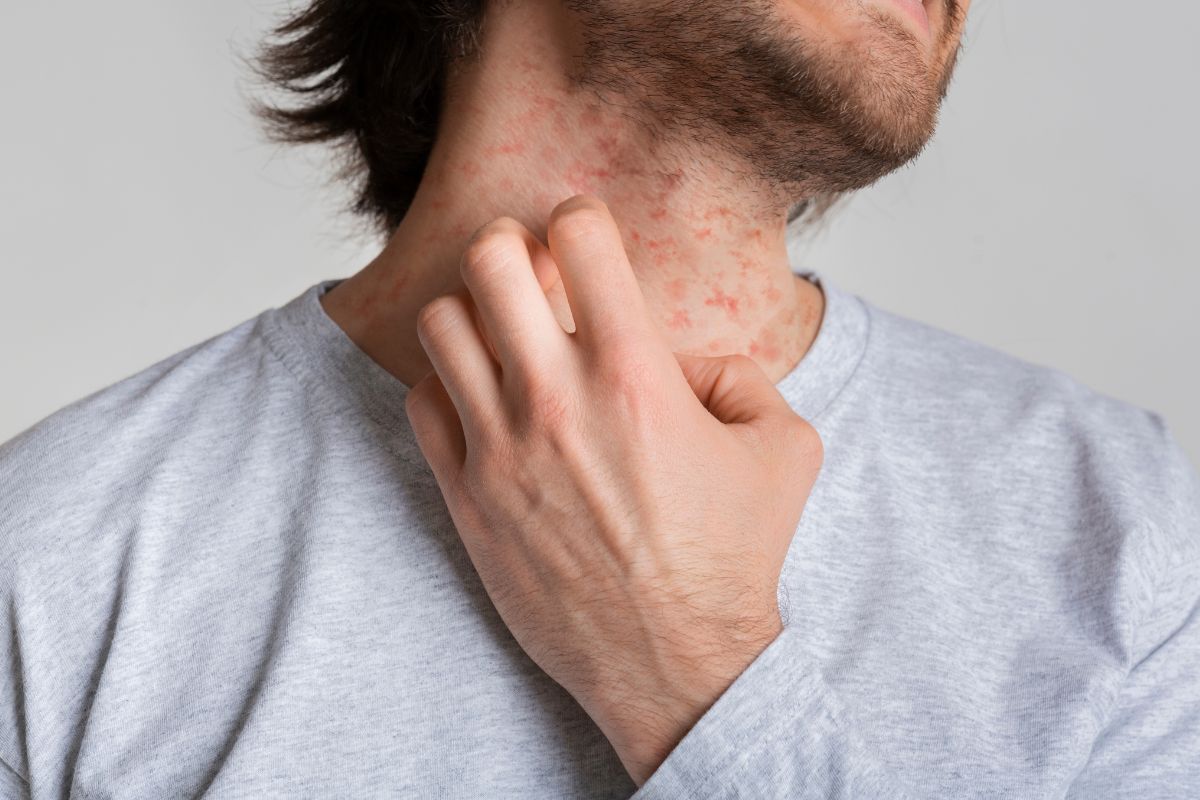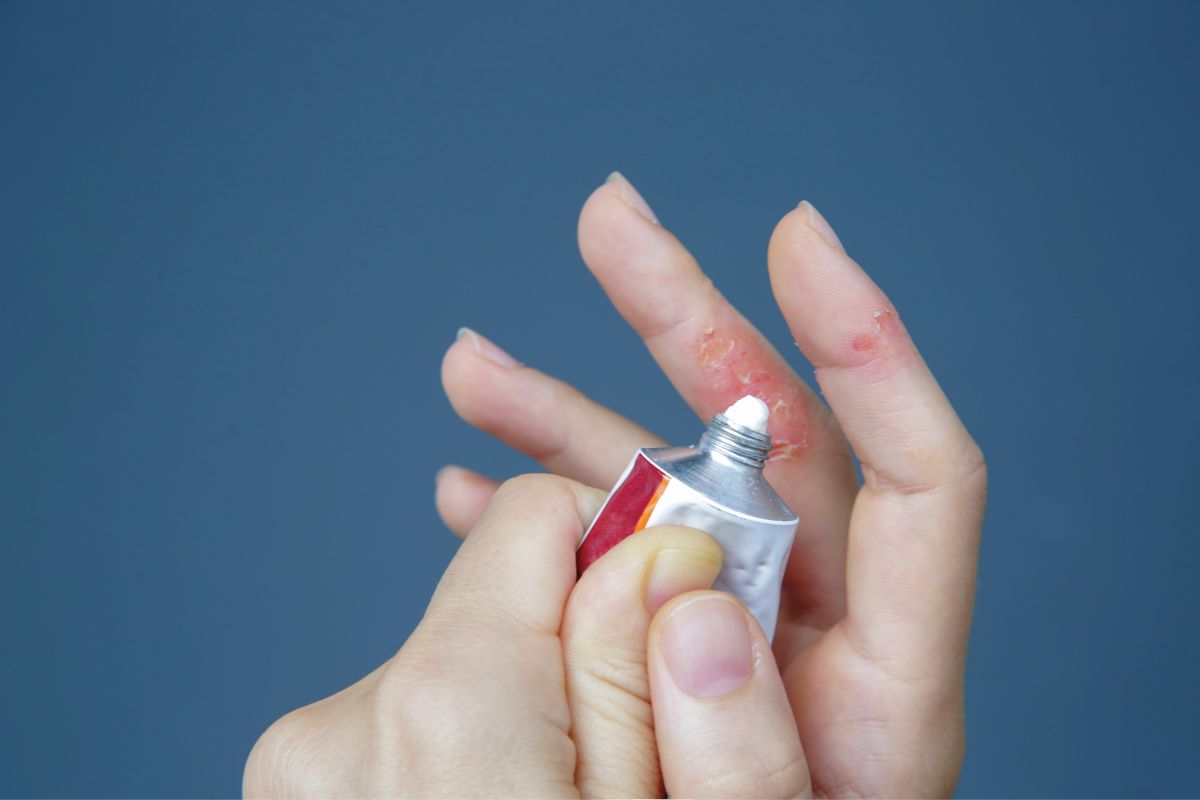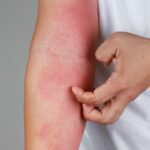Every once in a while we all get itchy skin.

It is just going to happen, as skin is the largest organ on the body, and it will have dead skin cells or things that get on it from outside sources that irritate it and make it itch.
However, there are a series of conditions that cause the skin to become painful and constantly itchy.
One of these conditions is eczema (see also ‘10 Best Eczema Creams For Flare-Ups‘), which is a fairly common skin condition amongst children and to a lesser degree adults.
One of the big pieces of advice when it comes to eczema is: ‘Just ignore it.’
While this is in reference to eczema itchy nature, it is also a fairly terrible piece of advice for the condition itself.
You should never ignore eczema (see also ‘Moisturizing To Reduce Eczema (All You Need To Know)‘). But what can be done? What are the treatment options?
In this article, we will explore the best treatments and why you shouldn’t ignore eczema (see also ‘10 Best Eczema Shampoos For Sensitive Scalps‘).
What Is eczema?
Eczema (or Dermatitis) is a condition where skin on some part of the body becomes inflamed.
It can be anywhere, from your hands to your face to your feet, though some of these areas are rarer than others.
This inflammation is itchy, red, and normally comes with some form of rash.
The eczema is normally localized to distinct patches in certain areas and normally only spreads with encouragement, often through scratching – hence ‘ignore it’.
If you scratch, the area becomes more inflamed, resulting in more swelling and sores.
However, for long term eczema sufferers (atopic eczema) the itching is worse than the sore itself, and they will happily feel the pain associated with the welt caused by scratching, rather than constant and unbearable itching.
In long term eczema sufferers as well, there is an additional condition where the skin will constantly crack in areas where eczema is prolonged, thus causing open, weepy sores on the body.
The cause of eczema is not really known, and the disorder is not contagious, so it is probably not caused by sources outside of the human body.
The theories that exist for the cause are currently genetics, immune system dysfunction, problems with the skin’s permeability, and environmental exposures, but so far we only have theories for the causes.
Why You Should Always Treat Eczema And Never Ignore It?

There are a couple of reasons that you should never ignore eczema, no matter what people tell you, and these can be not only debilitating but affect your health majorly:
Your Quality Of Life
Eczema is not that life-threatening on its own, but it is debilitating and incredibly painful.
Constant open sores that move between incredible pain and a constant need to be scratched are not fun to live with, and whenever you move they can reopen.
It may also affect your confidence and how you view how you are perceived by others.
Infection
Scratching opens wounds and those wounds can become infected.
Infection can come from getting anything in sores, even from your own hands, and infections can lead to serious medical issues.
The Cause
Even though the cause of atopic and other eczema is poorly understood, eczema can be caused by other things as well.
Allergic contact eczema is caused by an allergic reaction to something and if you don’t find out what it is then you may suffer from a serious allergic reaction when you next come in contact with it.
As you can see, there are many reasons why you should seek out a doctor and get treatment for simple old eczema.
If you don’t, it could have a serious effect on your health and life in general.
Treatments For Eczema
Unfortunately, eczema has no cure or magic pill for it to go away, and treatment often revolves around you having to nurse your skin and practice self-care to help your body out.
There are a few ways to do this: medications, medical creams, environmental changes, and habit changes.
First, let’s look at medications and medical creams. The most effective treatment is the use of corticosteroids or steroids.
While the most common view is that they are used illegally by bodybuilders, their most important role is as a treatment in medicine, normally as an anti-inflammatory.
Since eczema starts an inflammation condition and then becomes worse over time, they are useful for stopping the problem at the source.
Hydrocortisone is a mild strength steroid cream that is spread over the affected area to reduce the inflammation and thus the problems associated with it.
For severe cases of eczema, higher grades of steroids are used to treat the condition.
While steroids are great for treating eczema, long term use means your body can become dependent on them, and you may experience skin rashes and other problems when you come off them, however they can only be prescribed by a doctor, so they are used when necessary.
Emollient creams are also used. These are moisturizing creams that soothe and hydrate the skin, by keeping it moist throughout the day.
They don’t cure the condition, but they stop it from getting worse or feeling as painful or itchy.
They can be used as soap substitutes, creams, lotions, and sprays and have no real side effects to speak of.
Environmental and habit changes are about you making conscious decisions.
It would be about you stopping scratching as often, keeping your home humid, not eating foods that may cause a flare up, occupying yourself, and so on.
These require extreme self-control and discipline.
If you do this method, please get a support network to help you – either family, friends, or even colleagues and teachers (if you trust them).
Conclusion
Eczema is an awful condition that affects millions and makes life miserable for a lot of people.
But there are ways to treat the condition and make it much more bearable to live with.
Therefore, you should seek out treatment for your own health and sanity.
Remember to speak to a doctor about your condition before seeking out treatment yourself as well.
- Understanding Male Reproductive Health: A Complete Guide - February 2, 2025
- Simple Healthy Skin Habits for Radiant Skin - December 6, 2024
- Unlocking the Connection Between Nutrition and Mental Health - December 3, 2024








